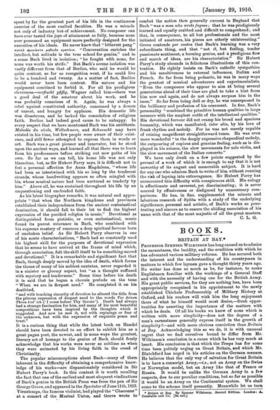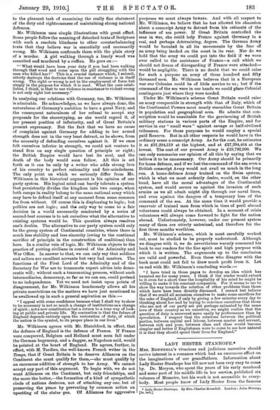BOOKS.
BRITAIN AT BAY.*
PROFESSOR SPENSER WILKINSON has long caused us to admire the earnestness, the lucidity, and the erudition with which he has advocated various military reforms. He has secured both the interest and the understanding of his countrymen in matters to which few laymen gave a thought thirty years ago. No writer has done so much as he, for instance, to make Englishmen familiar with the workings of a General Staff and with the necessity of having one for the British Army. His great public services, for they are nothing less, have been appropriately recognised in his appointment to the newly established Chichele Professorship of Military History at Oxford, and his readers will wish him the long enjoyment there of what he himself would most desire,—fresh oppor- tunities for asserting the importance of the matters with which be deals. Of all his books we know of none which is written with more simplicity—does not the degree of a man's earnestness generally express itself in the growth of simplicity P—and with more obvious conviction than Britain at Bay. Acknowledging this as we do, it is with unusual regret that we find ourselves bound to differ from Mr. Wilkinson's conclusion in a cause which he has very much at heart. His conclusion is that which the Temps hat for some time been politely urging on Great Britain, and which Mr. Blatchford has urged in his articles on the German menace. He believes that the only way of salvation for Great Britain is to have a conscript Army,—i.e., not an Army on the Swiss or Norwegian model, but an Army like that of France or Russia. It would be unlike the German Army in a few respects, due to our peculiar conditions, but so fax as possible it would be an Army on the Continental system. We shall come to the scheme itself presently. Meanwhile let us turn • .Britain at Bath B, Spenser Wilkinson. Second Edition. London : A. Conitible and Co. [Si. nat..]
to the pleasant task of examining the really fine statement of the duty and righteousness of maintaining Ettrong national defences.
Mr. Wilkinson uses simple illustrations with great effect.
Some people follow the meaning of detached texts of Scripture with such a resolute blindness to other counterbalancing texts that they believe war is essentially and necessarilY wrong. Mr. Wilkinson confounds them with the plain story of a murder. A girl walking through a lonely wood was assaulted and murdered by a ruffian. He goes on
What Would have been your duty if you had been walking through that wood and come upon the girl struggling with the man who killed her?' This is a crucial instance which, I submit, utterly destroys the doctrine that the use of violence is in itself wrong. The right or wrong is not in the employment of force but siMply in the purpose for which it is used. What the case estab- lishes, I think, is that to use violence in resistance to violent wrong is not only right but necessary."
In analysing our relations With Germany, too, Mr. Wilkinson is admirable. He acknowledges, as we have always done, the naturalness of Germany's ambition to have a great Navy, and the consequent naturalness of her refusal to accept any proposals for the stereotyping, as she would regard it, of her present position of inferiority, and of Great Britain's present supremacy. But the fact that we have no cause of complaint against Germany for adding to her armed strength does not in the very least detract, as he shows, from the necessity of defending ourselves against it. If we once felt ourselves inferior in strength, we could not venture to stand firm on any single question of principle or right; the British Empire would have lost its soul, and the death of the body would soon follow. All this is set forth as it can be only by a writer who adds strong lbvi3 of his country to perfect rationality and fair-mindedness.
The only point on which we seriously differ from Mr. Wilkinson in this historical argument is his opinion of our party system. His logical mind can barely tolerate a system that persistently divides the kingdom into two camps, when both camps in reality belong to the same national army which may have to defend itself at any moment from some common foe from without. Of course this is displeasing to logic; but politics are not logic; and the only way to come to a fair decision in a world necessarily conducted by a series of second-best courses is to ask ourselves what the alternative to existing systems would be. This question always resolves one's doubts. The alternative to our party system could only be the group system of Continental countries, where there is much less stability and less sincerity (owing to the continual sacrifice of principle in the construction of coalitions) than here. In a similar vein of logic, Mr. Wilkinson objects to the practice of putting civilians in control of the Admiralty and War Office. In answer to that, we can only say that soldiers and sailors are excellent servants but very bad masters. The functions of the First Lord of the Admiralty and of the Secretary for War are to transmute expert advice into demo- cratic will; without such a transmuting process, without such intermediaries, democracy, so far as we can see, could pretend to no independence. Yet we need not insist upon points of disagreement, for Mr. Wilkinson handsomely allows all his private convictions on the matters we have just mentioned to be swallowed up in such a general aspiration as this :—
"I appeal with some confidence because what I shall try to show to be necessary is not so much a change of institutions as a change of spirit ; not anew constitution but a return to a true way of look- ing at public and private life. My contention is that the future of England depends entirely upon the restoration of duty, of which the nation is the symbol, to its proper place in our lives."
Mr. Wilkinson agrees with Mr. Blatchford, in effect, that the defence of England is the defence of France. If France were conquered, Belgium and Holland must soon fall under the German hegemony, and a dagger, as Napoleon said, would be pointed at the heart of England. He agrees, further, in effect, with M. Tardieu, the well-known French writer in the Temps, that if Great Britain is to deserve Alliances on the Continent she must qualify for them,—she must qualify by an enormous addition of strength to her Army. We cannot accept any part of this argument. To begin with, we do not want Alliances on the Continent, but only friendships, and the more the better,—the formation of a kind of sympathetic circle of nations desirous, not of attacking any one, but of preserving the peace by preventing by common action an upsetting of the status quo. Of Alliances for aggressive
purposes we meat always befial.e. And with all respect to Mr. Wilkinfion, *e belieit that he haft allowed his obsession about a conscript Artily to detract from his estimate of OA influence of Sea pciWer. If Great Britain controlled the seas in War, She cdtdd help Fiance against Gettnany in a real, and perhaps deteimining, degree. The German Arno. Would be haunted in all its movements by the fear of in army being landed on the coast in its rear. Nor do we hold that the army We could put into the field if We were ever called to the assistance of France—a call which we should not dream of disregarding if France wete attacked— would be negligible. There is no doubt that we could raise for such a purpose an army of three hundred and fifty
thousand men. Mr. Wilkinson believes that in a European war our Colonies could be of little service to us ; but if the cdmmand of the sea were in our hands we could place Colbnial contingents just where they were needed.
Under Mr. Wilkinson's scheme Great Britain would raise an army comparable in strength with that of Italy, which of the Continental Powers most nearly resembles Great Britain in population and geographical area. He admits that con- scription would be unsuitable for the garrisoning of British military stations in variona parts of the Empire, and for service in our" small wars" against savage or half-civilised tribesmen. For these purposes he would employ a special paid Reserve. Bat in all other respects he would have in the ordinary sense a conscript Army. As for the cost, he estimates it at 231,294,519 at the highest, and at 227,394,464 at the lowest. The cost of our present Army is 228,792,900. We can only summarise our opinion of all this by saying that we believe it to be unnecessary. Our Army should be primarily for home defence, and if we lost the command of the sea even a. British conscript Army would not avail us much in the long run. A home-defence Atmy trained on the Swiss system, which is what we most ardently desire, would, on the other hand, have all the moral advantages of the Continental system, and would secure us against the invasion of such armies as we all admit might slip through our naval lines, and even against the dangers of a temporary loss of the command of the sea. At the same time it would provide a reservoir of trained men from which in time of peril abroad volunteers 'could always be obtained. In a moment of crisis volunteers will always come forward to fight for the nation abroad. Unfortunately, however, under our present system many of them are utterly untrained, and therefore for the first three months worthless.
Mr. Wilkinson's scheme, which is most carefully worked out, must be studied to be properly understood. Although we disagree with it, we do nevertheless warmly commend his book to our readers for the fine spirit and high purpose with which it is written. The arguments up to the conclusion are valid and powerful. Even those who disagree with the book most could not fail to draw much profit from it. Let us end with Mr. Wilkinson's concluding words :—
" I have tried in these pages to develop an idea which has haunted me for many years. I think if the reader would extend to it even for a short time the hospitality of his mind he might be willing to make it his constant companion. For it seems to me to show the way towards the solution of other problems than those which have here been directly discussed. I cannot but believe that if we could all accustom ourselves to make some sacrifices for the sake of England, if only by giving a few minutes every day to thinking about her and by trying to convince ourselves that those who are not of our party are yet perhaps animated by the same love of their country as we ourselves, we might realise that the question of duty is answered more easily by performance than by speculation. I suspect that the relations between the political parties, between capital and labour, between master and servant, between rich and poor, between class and class would become simpler and better if Englishmen were to come to see how natural it is that they should spend their lives for England."























































 Previous page
Previous page